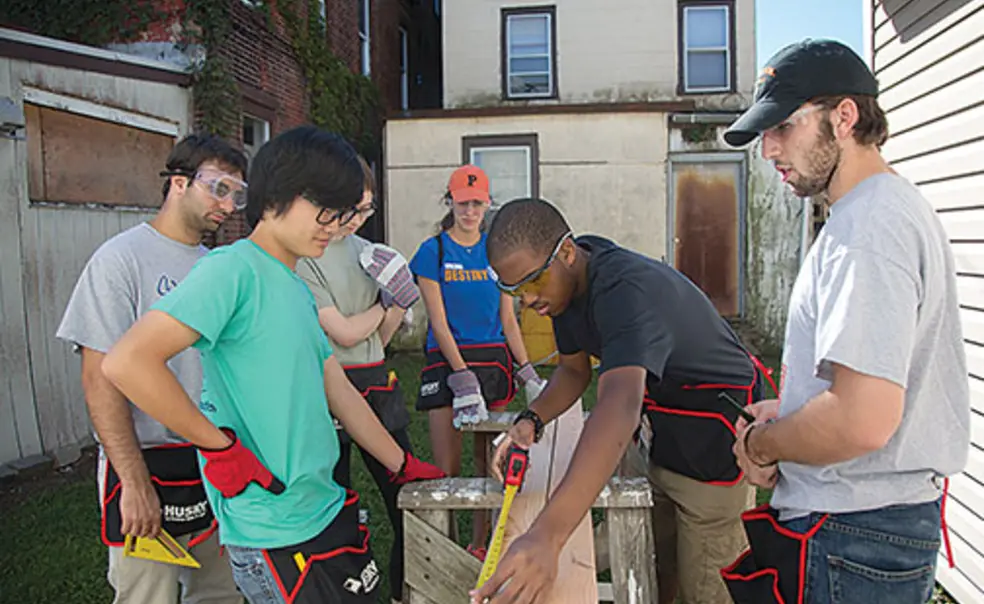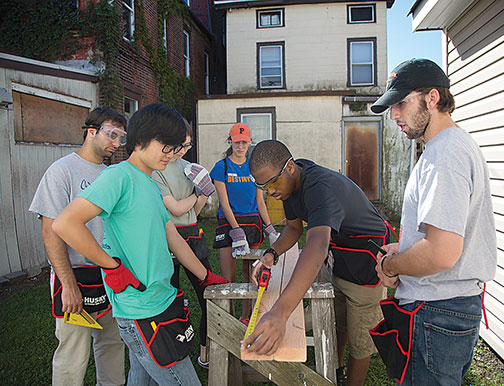A Larger Civic Role
Eisgruber says service should be central to the Princeton experience
Welcoming freshmen to campus last fall, President Eisgruber ’83 said he believed that “living well has at least two parts to it: living a life that makes you happy, and living a life that is of service to others.” He has repeated that theme at meetings since then, speaking of “making service central to the Princeton experience.” In support of that goal, the University is enhancing its civic-engagement opportunities by expanding activities for freshmen, adding international trips, and increasing internships.
Next fall, the University will boost by a third the number of slots for Community Action, a weeklong service program for freshmen that is held, along with Outdoor Action, right before the school year starts. Participating in Community Action “will help to inculcate that ethos around service,” said Kimberly de los Santos, who took over as director of the University’s Pace Center for Civic Engagement in 2012. The center launched its first international service trip this year, when seven students helped provide low-cost energy to a remote village in Peru. Like most Pace Center projects, the trip was proposed and organized by students.
Princeton Internships in Civic Service (PICS), an initiative that creates and funds summer internships, is on track to double the number of students who participate, to 150, in the next two years. The paid internships are developed by alumni, who serve as mentors to the students. The program, which aims to foster a lifelong interest in civic engagement, was started by the Class of 1969 for its 25th reunion and is housed on campus but funded mainly by alumni. A PICS internship in education led Dawn Leaness ’06 to a job at a charter school, where she is the director of development. Working at Young Scholars Charter School in Philadelphia “opened my eyes to what was out there to do in education,” she said.
202 incoming freshmen took part in Community Action
111 students went on breakout trips in nine U.S. cities to explore social issues
91 undergraduates held summer internships with nonprofits
141 volunteers — students as well as faculty, staff, and alumni — tutored and taught courses at local prisons
550 students took part in 41 ongoing projects through Community House and the Student Volunteers Council
(All figures for 2013–14)
In 2012, about 50 percent of seniors reported having participated in service as an undergraduate, according to de los Santos. Eisgruber “would like to see a larger number of students have some sort of service experience during their time at Princeton,” he told PAW. “I also hope that we might find new ways to tie service initiatives into the residential colleges.”
Stanley Katz, who has taught at Princeton for 36 years, believes the University should be doing more to draw students into service. “We have been behind the curve, in my judgment, of what peer institutions are doing,” said Katz, a lecturer with the rank of professor at the Woodrow Wilson School. “I think there is a tremendous opportunity for the University to do more.” He suggests civic engagement be more closely aligned with academics, so that service projects would be connected to courses, and students would get academic credit for volunteer work. “There’s no lack of demand on the part of students,” Katz said. “There is a radical lack of opportunity.”
“Unfortunately, I don’t think service is as large a focus as you would expect with a school with our slogan,” said Lyra Schweizer ’16, an executive board member of the Student Volunteers Council (SVC). (Princeton’s unofficial motto is “In the nation’s service and in the service of all nations.”) She hopes the University will do more to expose students to volunteer opportunities early in their freshman year with events such as last year’s civic-engagement activities fair. Along with others at the SVC, Schweizer is trying to bring more attention to volunteering: “I want to make service more accessible to students who might not seek it on their own.”













No responses yet